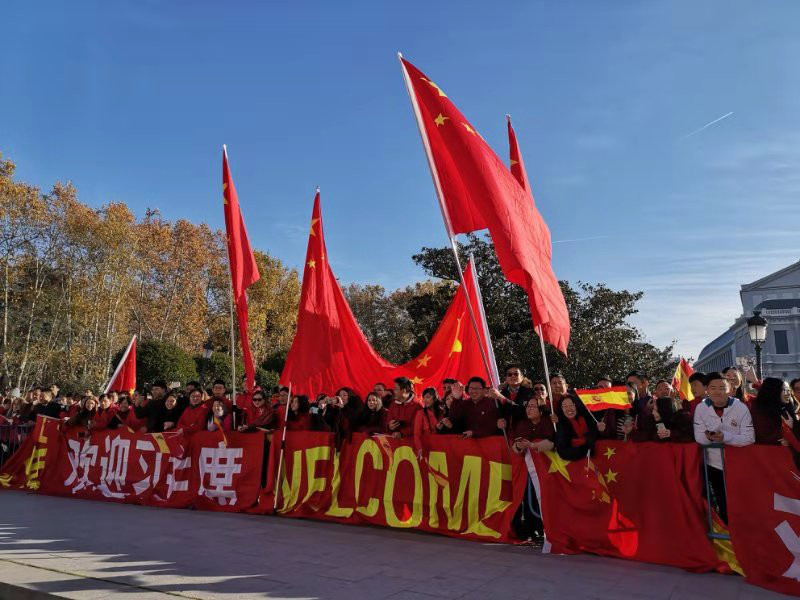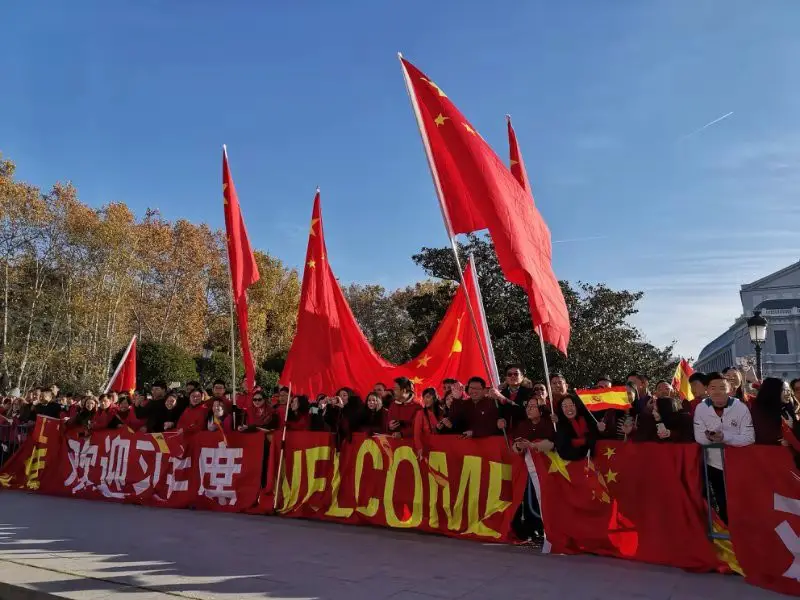People’s Daily

Spain has become an indispensable trade partner of China in Europe, and China remains the largest non-EU trade partner of Spain. The bilateral trade between the two sides has exceeded $30 billion.
The Belt and Road Initiative is a bond linking more and more Chinese and Spanish, and the Yiwu-Madrid freight route is an example.
The 13,052-kilometer railway starts from eastern China’s city of Yiwu. It is the longest among all China-Europe freight routes, and also the one that crosses the most countries with the highest cargo load factor. In addition, it is the longest freight train route in the world as well.
“It takes a minimum of 16 days for the train to arrive in Madrid from Yiwu, which opened a safe, efficient, convenient and green logistics channel for China-Spain trade exchanges,” said He Jinfa, general manager for imports at Zhejiang China Commodities City Group Co., Ltd.
Currently, three trains run on the track from Yiwu to Madrid every week, and one operates the other way around.
So far, 13 autonomous communities, as well as major seaports and inland ports of Spain have established cooperation with the rail route for joint development of the cargo service.
Yiwu’s imports from Spain hit $10.1 million last year, 106.97 percent higher from a year ago. Total exports of Spain to Yiwu increased three folds when compared with that in 2014.
“China-Europe freight trains are creating opportunities for Spain,” said vice president Juan Lazaro of CEOE, a Spanish institution that represents the Spanish business community.
Apart from the China-Europe cargo service, the investment from Chinese enterprises to major Spanish ports in recent years also contributed to the rapid growth of Spain’s trade with China as it has largely improved the operation efficiency of these ports.
On June 12, 2017, China’s shipping company COSCO Shipping Ports signed a deal with Noatum Ports Holdings (NPH), the largest operator of container terminals in Valencia, Spain, to buy 51 percent equity of the latter.
“Chinese team brought advanced management and operation mode, creating new opportunities and benefits for the Spanish port city and its people,” noted Mar Chao, commercial and business development director of the Port Authority of Valencia.
The NPH handled a total of over 3 million twenty-foot equivalent units (TEUs) in the first 10 months of this year, registering a 12.8-percent growth year on year.
It handled 326,000 TEUs in May alone, the best single-month performance since the establishment of the company.
“At present, the company has 416 employees, only 3 of whom were sent from China. Along with more than 1,000 positions from labor outsourcing, the company has created over 1,500 jobs for the local community,” introduced Sun Kai, CEO of NPH.
In 2016, Spanish telecommunications company Telefonica started cloud services in Brazil, Mexico and Chile by adopting cloud technologies and experiences of Chinese tech giant Huawei.
In 2017, Chinese oil and gas enterprise Sinopec and Spanish-based general contractor Tecnicas Reunidas S.A. established the consortium Al Zour Refinery in Kuwait.
In 2018, the Industrial and Commercial Bank of China led financing to encourage Chinese and Spanish enterprises to build photothermal power plants in Dubai.
On Oct. 16 this year, China Three Gorges Corporation and Spanish constructor ACS Group agreed to jointly develop and construct the 1,100-megawatt Inga III Hydro-electric Dam in the Democratic Republic of Congo. It is another successful cooperation between Chinese and Spanish companies to expand third-party markets.
In recent years, enterprises from the two countries have conducted batches of projects in the Middle East, Africa and Latin America through financing, labor division, technology cooperation and consortiums.
Secretary of State of Trade from Spain’s Ministry of Industry, Trade and Tourism Xiana Margarida Mendez Bertolo told People’s Daily that third-party market would be a focus of China-Spain cooperation.
Chinese and Spanish enterprises enjoy complementary advantages in multiple aspects, she said, adding that they can not only enhance cooperation in third-party markets in Latin America and Africa, but also jointly explore the markets of other Belt and Road countries and regions.
The Belt and Road Initiative is a bond linking more and more Chinese and Spanish, and the Yiwu-Madrid freight route is an example.
The 13,052-kilometer railway starts from eastern China’s city of Yiwu. It is the longest among all China-Europe freight routes, and also the one that crosses the most countries with the highest cargo load factor. In addition, it is the longest freight train route in the world as well.
“It takes a minimum of 16 days for the train to arrive in Madrid from Yiwu, which opened a safe, efficient, convenient and green logistics channel for China-Spain trade exchanges,” said He Jinfa, general manager for imports at Zhejiang China Commodities City Group Co., Ltd.
Currently, three trains run on the track from Yiwu to Madrid every week, and one operates the other way around.
So far, 13 autonomous communities, as well as major seaports and inland ports of Spain have established cooperation with the rail route for joint development of the cargo service.
Yiwu’s imports from Spain hit $10.1 million last year, 106.97 percent higher from a year ago. Total exports of Spain to Yiwu increased three folds when compared with that in 2014.
“China-Europe freight trains are creating opportunities for Spain,” said vice president Juan Lazaro of CEOE, a Spanish institution that represents the Spanish business community.
Apart from the China-Europe cargo service, the investment from Chinese enterprises to major Spanish ports in recent years also contributed to the rapid growth of Spain’s trade with China as it has largely improved the operation efficiency of these ports.
On June 12, 2017, China’s shipping company COSCO Shipping Ports signed a deal with Noatum Ports Holdings (NPH), the largest operator of container terminals in Valencia, Spain, to buy 51 percent equity of the latter.
“Chinese team brought advanced management and operation mode, creating new opportunities and benefits for the Spanish port city and its people,” noted Mar Chao, commercial and business development director of the Port Authority of Valencia.
The NPH handled a total of over 3 million twenty-foot equivalent units (TEUs) in the first 10 months of this year, registering a 12.8-percent growth year on year.
It handled 326,000 TEUs in May alone, the best single-month performance since the establishment of the company.
“At present, the company has 416 employees, only 3 of whom were sent from China. Along with more than 1,000 positions from labor outsourcing, the company has created over 1,500 jobs for the local community,” introduced Sun Kai, CEO of NPH.
In 2016, Spanish telecommunications company Telefonica started cloud services in Brazil, Mexico and Chile by adopting cloud technologies and experiences of Chinese tech giant Huawei.
In 2017, Chinese oil and gas enterprise Sinopec and Spanish-based general contractor Tecnicas Reunidas S.A. established the consortium Al Zour Refinery in Kuwait.
In 2018, the Industrial and Commercial Bank of China led financing to encourage Chinese and Spanish enterprises to build photothermal power plants in Dubai.
On Oct. 16 this year, China Three Gorges Corporation and Spanish constructor ACS Group agreed to jointly develop and construct the 1,100-megawatt Inga III Hydro-electric Dam in the Democratic Republic of Congo. It is another successful cooperation between Chinese and Spanish companies to expand third-party markets.
In recent years, enterprises from the two countries have conducted batches of projects in the Middle East, Africa and Latin America through financing, labor division, technology cooperation and consortiums.
Secretary of State of Trade from Spain’s Ministry of Industry, Trade and Tourism Xiana Margarida Mendez Bertolo told People’s Daily that third-party market would be a focus of China-Spain cooperation.
Chinese and Spanish enterprises enjoy complementary advantages in multiple aspects, she said, adding that they can not only enhance cooperation in third-party markets in Latin America and Africa, but also jointly explore the markets of other Belt and Road countries and regions.
 Menu
Menu
 China, Spain to jointly usher in new chapter of Belt and Road construction
China, Spain to jointly usher in new chapter of Belt and Road construction
















